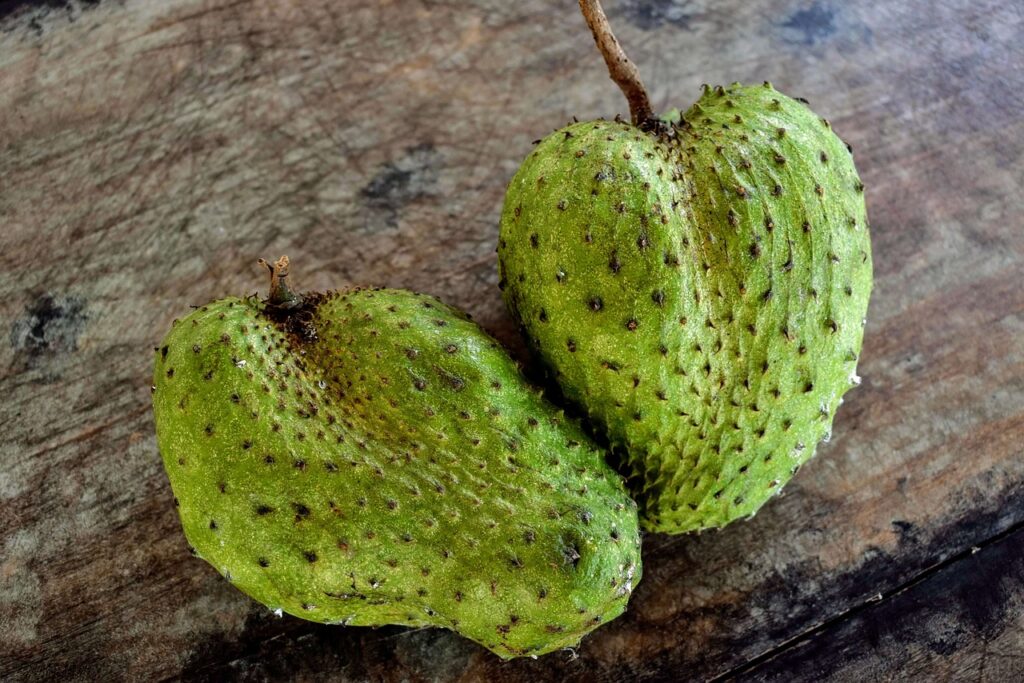
Soursop Fruit and Its Potential in Cancer Treatment: A Comprehensive Review
The tropical fruit known by its scientific name, Annona muricata, or “soursop,” has drawn interest due to its possible health advantages, especially in the area of cancer treatment. Other names for soursop, which are native to tropical regions of Central and South America, include Brazilian paw-paw, Graviola, and Guanábana. With an emphasis on its active ingredients, this article examines the nutritional profile of soursop, its historical applications, and the scientific data bolstering its potential as a cancer treatment.
Nutritional Profile of Soursop
It’s important to comprehend the nutritional makeup of soursop before exploring its possible anticancer capabilities. Soursop has several health benefits because it is a great source of different nutrients. The fruit’s strong vitamin C content is well known for giving the immune system a significant boost. Soursop also has high levels of potassium, fiber, and a number of important vitamins and minerals.
Traditional Uses of Soursop
Many cultures have traditionally used soursop for its therapeutic qualities dating back many centuries. The fruit, leaves, and seeds of the soursop tree have all been used by indigenous tribes in tropical locations to treat a range of health issues. Among the customary applications of soursop are:

Antimicrobial Properties
For centuries, soursop has been utilized as a home treatment for fungal and bacterial illnesses. The antibacterial qualities of the plant’s leaves and bark make them useful for treating skin infections and accelerating the healing of wounds.
Digestive Health
Because of its high fiber content, soursop is good for your digestive system. Soursop has long been used to support a healthy digestive tract and ease stomach problems including constipation.
Pain Relief
Because soursop formulations have analgesic qualities, indigenous people have utilized them to treat rheumatism and arthritis as well as other painful ailments.
Scientific Research on Soursop and Cancer

There is a lot of scientific interest in soursop because of its possible anticancer qualities. The effects of soursop extracts and chemicals on cancer cells in lab settings and animal models have been the subject of numerous investigations. Although soursop research is still in its infancy, several encouraging results point to a potential role for the plant in cancer treatment. The main ingredients thought to play a role in soursop’s anticancer properties include antioxidants, alkaloids, and acetogenins.
Acetogenins
Acetogenins are a class of chemicals that have been shown to have anti-tumor activities, and are among the most researched parts of soursop. Acetogenins are thought to stop the growth of cancer cells by obstructing particular enzymes necessary for the cells to survive. Studies have demonstrated that acetogenin-rich soursop extracts can cause cancer cells to undergo programmed cell death, or apoptosis.
Alkaloids
A number of alkaloids found in soursop, such as muricine and annonaine, have been shown to have cytotoxic effects on cancer cells. These alkaloids prevent cancer cells from proliferating by interfering with the cell cycle. These substances might help stop cancers from growing, according to some research.
Antioxidants
Soursop’s potential for cancer prevention and treatment is facilitated by its strong antioxidant content. Free radicals are very reactive chemicals that can harm cells and have a role in the emergence of cancer. Antioxidants aid in the neutralization of free radicals. Antioxidants in soursop may aid in shielding cells from DNA damage and mutations by lowering oxidative stress.
Clinical Studies and Human Trials
Although research conducted on animals and in vitro can yield insightful information, human clinical trials are necessary to confirm the safety and efficacy of soursop in the treatment of cancer. The effect of soursop on human cancer has been the subject of numerous pilot projects and clinical trials.
Breast Cancer
In 2014, a tiny clinical experiment looked into the benefits of soursop extract on breast cancer patients. A possible advantage was indicated by the study’s finding that some participants’ tumor sizes shrank. To validate these results, larger and more thorough experiments are necessary.
Prostate Cancer
The effect of soursop on prostate cancer cells was investigated in a different investigation. The findings showed that soursop extract caused apoptosis and slowed the development of prostate cancer cells. Even though these results show promise, more investigation is required to establish the ideal dosage and safety profile for application in humans.
Colorectal Cancer
There is continuing research on soursop’s possible benefits in colorectal cancer. In colorectal cancer cells, some research indicates that soursop extracts may have anti-cancer properties; nevertheless, larger-scale clinical trials are required to make firm findings.
Challenges and Considerations
Notwithstanding the encouraging results, it’s important to recognize the difficulties and factors that come with using soursop in cancer treatment:
Limited Clinical Evidence
With few human clinical studies, most soursop research on cancer is still in the preclinical stage. Even if the outcomes of research conducted on animals and in laboratories are promising, more thorough and well planned clinical trials are required to determine the safety and effectiveness of soursop in people.
Optimal Dosage and Formulation
It’s still difficult to figure out the best soursop dosage and composition for treating cancer. Standardized recommendations have been challenging to develop because different research have utilized different concentrations of soursop extracts.
Potential Side Effects
Although soursop is generally harmless when eaten in moderation, too much of it might have negative effects. According to certain accounts, soursop extracts at large doses may have a neurotoxic effect on the nervous system. Before adding soursop to cancer treatment plans, it is imperative to speak with medical authorities.
Conclusion
The tropical fruit known as soursop, which has a high nutritional profile, has showed potential as a cancer treatment. The existence of bioactive substances like antioxidants, alkaloids, and acetogenins has piqued scientists’ curiosity about the plant’s possible anticancer effects. Even while research in the lab and on animals has produced promising results, larger-scale, well planned human clinical trials are required to confirm these results and prove soursop to be a practical cancer treatment alternative.




